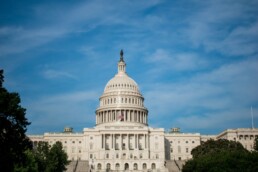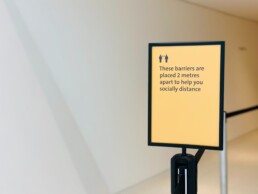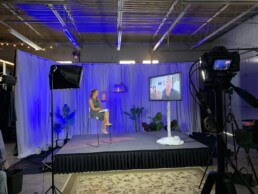Exhibitions & Conferences Alliance (ECA) Unveils 2024 Public Policy Agenda
Source: MidWest Meetings
The Exhibitions & Conferences Alliance (ECA) has set the stage for its advocacy efforts in 2024, identifying key focus areas that underscore the industry's vital role in economic growth and job creation.
As Congress has recently convened, the ECA's comprehensive agenda aims to ensure a favorable operating environment for the business events sector, foster seamless international travel and commerce, and create a welcoming atmosphere for industry activities across states and cities.
Priorities for Economic Growth and Workforce Development
Hervé Sedky, Emerald Holding Inc.'s President, CEO, and Chair of the ECA board, emphasized the laser focus on policies supporting economic growth, job creation, and small businesses. The agenda outlines six top priorities for the year, including restoring visa operations to pre-pandemic levels, supporting government policies for attracting and training the industry's future workforce, and reinstating communicable disease coverage in event cancellation insurance. These initiatives aim to not only navigate the challenges of the present but also lay the groundwork for a resilient and thriving future.
Building on 2023 Successes and Future Advocacy Initiatives
The ECA plans to build on the successes of 2023, such as amending Chicago's paid-leave law to exclude business events visitors and advancing legislation in Congress for expanding skills-based training opportunities. Looking ahead, the alliance is set to introduce new advocacy capabilities, empowering industry leaders and advocates to actively participate in the political and policymaking processes. By staying proactive and adaptive, the ECA aims to amplify the impact of its advocacy efforts, fostering an environment conducive to the growth and sustainability of the business events industry.
Tick-Tock Triumph: Mastering Time Management for Event Planners
Read the full article on the ExpoPass website
In the fast-paced world of event planning, time is the ultimate currency. A robust time management strategy isn't just a tool; it's the secret ingredient to orchestrating flawless events without unnecessary stress. Efficient time utilization not only keeps you on budget but also provides a cushion for unforeseen challenges, ensuring your events are executed with precision.
Our comprehensive time management guide for event planners delves into the organizational aspects that set the stage for success. From prioritizing tasks using the Pareto Method to establishing weekly and daily goals (the BIG THREE), we offer practical tips to conquer the ticking clock. Additionally, we explore effective scheduling techniques, emphasizing the importance of time blocking, deadlines, and strategic breaks to maintain focus and flexibility.
While technology can be a double-edged sword, we highlight its role as an invaluable ally in event planning. From setting alarms for time tracking to utilizing project management software like ActiveCollab and Monday, we guide you on leveraging technology to your advantage. Finally, we emphasize the often-overlooked aspect of rest, emphasizing its role in enhancing efficiency and preventing burnout.
In the world of event planning, where every minute counts, mastering time management isn't just a skill—it's the key to delivering exceptional experiences. Learn how to invest your time wisely and build a personalized toolkit for seamless event execution. "Tick-Tock Triumph" is your guide to transforming time from a challenge into your greatest asset.
The Benefits of Morning Meetings
February is Hot Breakfast Month, a perfect time to focus on the benefits of morning meetings, and how eating together enhances productivity. Â
Breakfast business meetings are typically more relaxed and informal than lunch meetings. As we gain a deeper understanding of the importance of breakfast, these meetings will only become more and more popular.
Ryan Estis is a leadership coach and speaker based in Minneapolis, MN. He explains to BBC Worklife why the early morning has become his go-to time for meetings: “I am caffeinated, centered and intentionally focused,†he says.Â
Benefits of Eating Together
A 2015 Cornell University study found that groups that eat together perform better together. In research that could have implications for organizations that want to enhance team performance, Cornell professors found that firefighter platoons who eat meals together have better group job performance compared with firefighter teams who dine solo. “Eating together is a more intimate act than looking over an Excel spreadsheet together. That intimacy spills back over into work,†said the study’s author, Kevin Kniffin, visiting assistant professor in the Charles H. Dyson School of Applied Economics and Management. “From an evolutionary anthropology perspective, eating together has a long, primal tradition as a kind of social glue. That seems to continue in today’s workplaces.â€
Check out one of Chicago’s most popular catering options for your breakfast or brunch meetings.
Using Art and Entertainment to Welcome Back Your Employees
Using Art and Entertainment to Welcome Back Your Employees
Many of us have traversed the rocky path of the last 8 months with tunnel vision, focused on the light up ahead that signals better days and a return to business as usual. However, we can acknowledge that this journey has not been without glimmers of light along the way, provided by virtual gatherings centered around art, music, and entertainment. The arts have both uplifted and grounded us during these trying times and continue to be the binding element that brings our communities together to tribute, network, and celebrate.
Live Art International hopes to continue this momentum by working with their clients to incorporate art and entertainment into their re-opening plans. Their visual approach to event branding is the perfect way for companies to energize employees and signal to the community that they are open for business. “We have 2 clients we are working with to design communal muralsâ€, notes CEO, Dayna Malow. “Companies are using the creation of art to signify a new beginning, with employees coming together at select times to each contribute to a unique mural being erected on site.†Music is also a cue that a celebration is in order. “ Gatherings that encourage dancing are still off the table, however, we are seeing some traction for our soloist and smaller ensembles, with adequate space allotment provided, so all can be at a safe and comfortable distanceâ€.
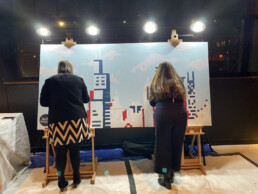
Covid precautions have also become a regular part of the coming celebration plans. “We have now adjusted our artist riders to request larger set-up space and accommodations for bands and musicians, and our art engagement experiences will account for disinfecting time and more disposable single-use materials.†says Malow, “We are helping our clients rethink their event structure, designing micro-activities where larger groups are sub-divided with participation occurring at scheduled times or multiple locations, allowing for social distancing. This approach is similar to the break out room activities we have all been participating in the last few months.â€
As for the coming months, and what the light at the end of the tunnel will mean for the entertainment industry in Chicago, Malow says, “Whatever your re-opening plans may be, we hope that companies will consider including art and music. The Chicago entertainment community will continue to struggle throughout the ramp up period. They have played an active role in providing inspiration and encouragement to get us to this point in time. Supporting entertainers and entertainment vendors allows them to survive another day and ensures that they will be here to provide the celebratory soundtrack when we are all truly back to business.â€
Brought to you by: Live Art International
How Hotels are Making it Safe for Tourism, Meetings & Events
Illinois Hotel & Lodging Association President and CEO, Michael Jacobson weighs in on the struggles the tourism industry has been facing since the pandemic hit. Jacobson expresses that hotels were the first to be affected and are potentially going to be the last to recover. Yet, he has hopes of “opportunity and optimism†in our industry.
Jacobson, Senior Vice President of Hyatt, Steven Enselein and General Manager of Embassy Suites By Hilton Chicago - Downtown, Kathy Heneghan discuss hotel safety protocols, the adaption to change and the future for events including hybrid. Back in April hotel occupancy in Chicago was at 22% and has slowly started to recover with the most recent rate of 39% in July.
In terms of hotel and event safety, Hilton has partnered with Lysol and Mayo Clinic to start CleanStay standards. A program that is dedicated to innovative solutions during COVID-19. It includes a cleaning protocol with a verified checklist, an “event-ready seal†put on every door, ensuring vendors are compliant with social distancing guidelines, flexible contracts, sanitation stations and a safer food & beverage experience for the guests and chefs by incorporating plexiglass.
In addition, Hyatt Hotels have also incorporated a comprehensive plan. They have partnered with the Cleveland Clinic and the Global Biorisk Advisory Council (GBAC) to create a safe experience from arrival to departure. It specifically targets what guests can expect and what changes they may face. Hyatt has provided mobile check in, a digital key, limited capacity in elevators, social distancing in restaurants, clear entrances & exits, and having the flexibility of choosing a time for housekeeping.“Communication is key and we want guests to feel comfortable and safe,†Enseilein stated.
Both hotels are focusing on proper training of staff for all protocols including issued masks, social distancing markers and signage around the lobby reminding guests and staff of the requirements. “Lead with Hospitality,†Hanaghen states, to remind guests to not only wear a mask, but to also remind them of why it’s needed.
If there is a silver lining to COVID-19, Enseilen says collaboration and working together has been seen more in this era than ever before, a hybrid component will only expand events and this an opportunity to remember why we meet face to face.
Managing Through Uncertainty
Uncertainty is inevitable, but leadership takes time. Michelle Mason, President & CEO of Association Forum, Kim Mosley, President of American Specialty Toy Retailing Association, and Kimberly Barnes, President and CEO of the Magnificent Mile Association, discuss their experiences of managing through uncertainty.
We have all reacted differently to the problems this pandemic has caused throughout the year. Mosley immediately jumped into action and knew she needed to create partnerships to make sure kids still had the chance to be kids this summer. Her organization worked with local schools to give toys during their food drives and worked with children museums to create packages filled with fun activities to keep kids occupied. Barnes also worked with her association to provide meals to communities who were severely hit by Covid-19.
While the pandemic has been a prevalent issue in the industry, the recent movement of racial injustice has sparked conversation everywhere. They welcome John Hockman, Principal of McKinley Advisors, to present key 2020 research findings concerning diversity and inclusion within the work environment. “44% of members said they have witnessed, experienced–or both–harassment, discrimmiation or bias in the last year,†said Hockman. He urges companies to diversify their leadership, raise awareness beyond just the basics, and to do something. Organizations may be at different points in their journeys, but no matter where they are, it is vital that they do something to advance welcoming environments.
Both Mosley and Bares are senior leaders in the industry, and want to lead by example. They have used their real life experiences to better understand their workers and to create a welcoming work environment for all. They are both advocates of self-care, and want to make sure their workers are taking care of themselves and not feeling overwhelmed. Barnes states it’s important that executives tell themselves “I need a break, I need to get this work done, but I also need to live to fight another dayâ€. A company can only thrive if they truly care about their workers in every sense.
What You Need to Know About #HTSOnline
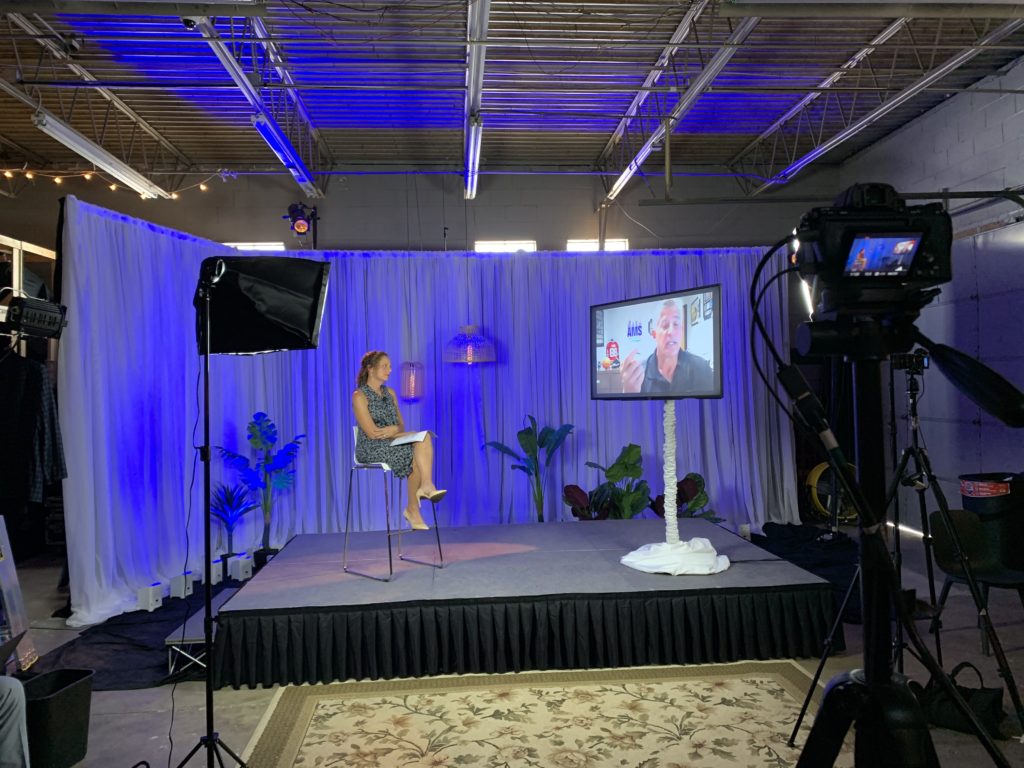
The Hospitality & Tourism Summit is coming at you completely online for its 19th annual year! So, what does that mean? How can a one-day trade show full of tangible experiences pivot to an online experience?
Ateema Media & Marketing, the producers of the summit, have worked hard over the last several months of quarantine to re-imagine the next best alternative. Dubbing this new format as the Hospitality & Tourism Summit Online, all attendees will have the ability to log on and log off at their leisure throughout the week.
The goal for the Hospitality & Tourism Summit is to bring together all industry friends after months of disconnect. The week is built for everyone to pick and choose their own pathway/schedule based on their interests, prior commitments, etc. Ateema has made this "pick and choose" format possible as they will be uploading the recordings of all of the webinars after they are presented live for attendees to watch on-demand. As well, attendees will have access to the trade show floor until next year's summit. They want all attendees to maximize their attendance but also be strategic with the programming you choose to attend live, because you can!
Keep on reading for some common misconceptions about the Hospitality & Tourism Summit Online and how you work around them:
Common Misconception #1: That you have to be online the entire week.
You do not! You can log on and log off based on what is on your personal agenda is each day. It is recommended that you choose a couple of opportunities to attend live each day. The summit has programming that is as short as 45 minutes. Even the longest sessions don't exceed 90 minutes.
Common Misconception #2: If you don't attend everything live, you won't be getting your ticket's worth.
So wrong! All educational sessions will be recorded and placed online for you to view at a later time that works better for you. The trade show floor will be live until April of 2021 so you can go back in at any time and keep browsing all of the exhibitor booths.
Common Misconception #3: Virtual networking is boring and awkward.
Not anymore! The Hospitality & Tourism Summit virtual networking events will be using a lifelike and user-friendly networking software that requires no prior setup on your part. Simply, click a link to enter the networking rooms, "walk-up" to any table, and join the conversation. If you aren't into the conversation or want to find some new people to talk to, leave the conversation just as easily! Live entertainment will also be provided during networking events.
Common Misconception #4: I am furloughed/out of work right now so this won't bring me value.
Switch your mindset! This is the PERFECT time for you to get involved if you are not currently working. At a time when many people in our industry are looking for solutions, trends, timely topics, and predictions for the future, you can say you were a part of those conversations! This is the time to invest in yourself.
Keep Company Culture with a Remote Workforce
It's no secret that we are amid something incredibly life changing. Businesses are going through many challenges and changes as companies transition to a remote workforce. If we know one thing has stood the test of time, it is the work ethic of employees.
Any emotional response from leadership can send a ripple through the company, good and bad. As we weather through this storm, every leadership team must align with how to encourage and appreciate all individuals within a company.
1. Recognize Small Wins
If fortunate enough, many individuals have already begun a remote working schedule. Even with progressive work environments, not everyone has the foundation in place to adapt to this new remote workforce structure. Technology may lapse, calls may drop and a new wave of company culture forms out of the idea of going to work in pajamas.
To keep a pulse on everyone's spirit, celebrate small wins. Every person on this planet is affected by this current pandemic. No matter the struggle, small or large, we are in this together. When leadership keeps a positive outlook by recognizing the good with the bad, these habits will trickle down to the rest of the team.
2. Appreciate Everyone Individually
Whether your team consists of a few employees or your company can fill half a football stadium, everyone is unique and interprets recognition differently. In order to adequately accommodate for each person's needs, it is important to connect with all of them individually.
Find the time to appreciate the hard work and initiative. From a simple 'thank you' to a gift card to the grocery store, appreciation goes a long way.
If your company has the means, formal modes of recognition are an easy way to celebrate individuals. Whether it is a commemorative medallion for a kooky version of work-from-home office Olympics, or an award for hitting those Q1 sales goals, rewards in the physical form are always a safe approach to recognition.
3. Give Support Often
There should be no short supply of appreciation. During this time, employees are not just the building blocks to a positive work culture. They are quite literally keeping every company afloat. Every day should be filled with support for those individuals that are putting all of their best efforts forward.
Take a few minutes each day to plan out how to support others. Is there something you can do as a manager to appreciate your employees differently today? Switching up the form of praise and appreciation each day will give employees a boost in morale. Not only will this give them something to look forward to, but this anticipation can positively impact their lives.
4. Be Genuine
Genuine appreciation will prevail during this difficult work environment. Appreciation validates a worker's efforts, but a genuine approach can increase the effect tenfold. By not just praising those around you but doing so with genuine interest and appreciation, employees will remember the sincerity for months afterwards.
A boost in productivity can occur during this time, but do not lose sight of what is important. Your employees are going to great lengths to keep their jobs functioning as normal as possible. In turn, receiving appreciation and recognition for their hard work will go a long way.
Find out what other small ways you can show big appreciation. From experience, our remote workforce is ready to help shape your recognition program to its fullest potential. Connect with us today.
Written By: Samantha Mikos
See this article and more on Cristaux.com

